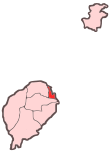Portal:São Tomé and Príncipe
 São Tomé and Príncipe, officially the Democratic Republic of São Tomé and Príncipe, is an island country in the Gulf of Guinea, off the western equatorial coast of Central Africa. It consists of two archipelagos around the two main islands of São Tomé and Príncipe, about 150 km (93.21 mi) apart and about 250 and 225 km (155 and 140 mi) off the northwestern coast of Gabon. With a population of 201,800 (2018 official estimate), São Tomé and Príncipe is the second-smallest and second-least populous African sovereign state after Seychelles. The islands were uninhabited until their discovery in 1470 by Portuguese explorers João de Santarém and Pedro Escobar. Gradually colonized and settled throughout the 16th century, they collectively served as a vital commercial and trade centre for the Atlantic slave trade. The rich volcanic soil and proximity to the equator made São Tomé and Príncipe ideal for sugar cultivation, followed later by cash crops such as coffee and cocoa; the lucrative plantation economy was heavily dependent upon enslaved Africans. Cycles of social unrest and economic instability throughout the 19th and 20th centuries culminated in peaceful independence in 1975. São Tomé and Príncipe has since remained one of Africa's most stable and democratic countries. São Tomé and Príncipe is a developing economy with a medium Human Development Index. The people of São Tomé and Príncipe are predominantly of African and mestiço descent, with most practicing Christianity. The legacy of Portuguese rule is also visible in the country's culture, customs, and music, which fuse European and African influences. São Tomé and Príncipe is a founding member state of the Community of Portuguese Language Countries. (Full article...) Selected article -Lesbian, gay, bisexual, transgender, and queer (LGBTQ) people in São Tomé and Príncipe face legal challenges not experienced by non-LGBTQ residents. Both male and female forms of same-sex sexual activity are legal in São Tomé and Príncipe, however LGBTQ persons face stigmatization among the broader population. São Tomé and Príncipe was one of the few African states that signed a "joint statement on ending acts of violence and related human rights violations based on sexual orientation and gender identity" at the United Nations, condemning violence and discrimination against LGBTQ people. (Full article...) This is a Good article, which meet a core set of high editorial standards.
São Tomé and Príncipe competed at the 2016 Summer Paralympics in Rio de Janeiro, Brazil from 7 to 18 September 2016. The country's participation in Rio marked its debut appearance in the quadrennial event, although it had competed in the Summer Olympics six times since the 1996 Games. The delegation consisted of a single short-distance runner Alex Anjos, who was chosen as São Tomé and Príncipe's flag bearer for the opening ceremony. Anjos was disqualified from the men's 100 metres (T47) for arriving late and failed to advance into the final of the men's 400 metres (T47) after failing to set a fast enough lap time. (Full article...) CategoriesDid you know -
Selected picture -In the news
Things to do
Topics– Districts –
Related portalsAssociated WikimediaThe following Wikimedia Foundation sister projects provide more on this subject:
Discover Wikipedia using portals |












































